| |
“I think the most important film that I’ve ever made, because it was a tremendous responsibility, and a tremendous challenge to me, as an actor, was to go for ten weeks to Pakistan and play the founder of the nation of Pakistan in front of his own people, which had never, ever been done. Now, the man’s name was Mohammad Ali Jinnah…” |
| |
Christopher Lee when asked about his favourite roles* |
When Richard Attenborough started assembling actors for his epic 1982 biopic of Gandhi, he faced a torrent of criticism over the casting of the great man himself. My favourite critique was from the outraged fellow who suggested the great Mahatma could only be realised on film as a form of glowing sprite, to which the great (and sadly late) 'Dickie' responded that he wasn't making a film about "...bloody Tinkerbelle!" Casting movies is mired in all sorts of preconceptions and prejudice. You have to find someone convincing for the part of a real historical figure (so there has to be some physical likeness) and they must have the charisma and skill to realise the role with some believability. Sir Ben Kingsley was perfect casting in hindsight but at the time, it was a decision much derided by those who had, in some respects, deified Gandhi and held his life and work in exalted terms. But Kingsley had enough Indian DNA to pull off the role with aplomb (his father hailed from Indian descent) and to this day it remains his signature role. Another main character in the drama of India's independence from the British Empire is the Muslim Mohammad Ali Jinnah. The casting in Gandhi gave us Alyque Padamsee and one assumes Attenborough and company made sure he was cast as a lookalike. After having seen pictures of the real Jinnah, Christopher Lee seems to be even more of a physical match despite his English background. I cannot believe I am writing the following but thousands of overly sensitive Pakistani souls ripped into the production citing the unsuitability of Lee because (clears throat) he played Dracula more than once. Do these people know what actors actually do? God knows how they would have reacted to Peter Capaldi getting the Doctor Who gig after his preter-pottymouth role as Malcolm Tucker. "Reverse the omnishambollocking polarity of the fucking neutron flow..." Jinnah was a huge hit in Pakistan... Those sensitive souls must have been vastly outnumbered.
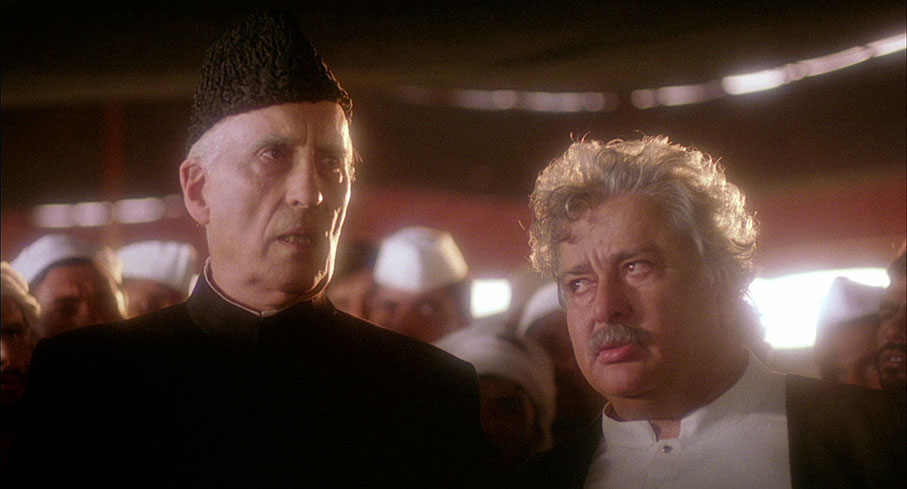
Jinnah begins with a Gandhi-inspired narrative inevitability – it starts with his death. While Attenborough had hundreds of thousands of extras turn up to recreate the funeral possession of the Mahatma, Jinnah was travelling with his sister when he met his end. From here, the ramrod straight figure arrives at a large house and converses with a stout man (a twinkle-eyed Shashi Kapoor) who is decrying being forced to go from paper accounting to computers. It seems that the minutiae of Jinnah's life has been lost. I tip my hat to director Dehlavi and fellow screenwriter Akbar S. Ahmed. This stout man is Jinnah's judge and when he barks "Tell him to go to hell!" on the phone regarding the fate of another poor soul, you suddenly realise that he's not just a judge, he may even be God! It's an unusual but lovely way to distance itself as a bio-pic from Gandhi, which is a tough act to follow whatever your story and especially when your story is the same story. So Jinnah's life is re-enacted so that God or some heavenly bureaucrat can judge to send him up or down and Dickensian-like, Jinnah becomes part of his own life as a third person observer and sometimes interacting with his younger self. It shouldn't work but does and rather well.
The real Jinnah was most concerned about the fate of the minority of Muslims in India once Great Britain relinquished it from its colonialist grip. For tragic and heart-breaking reasons once it was decided to form a new country (Pakistan) the border riots and religious inspired violence claimed millions of lives. I was hazy on why partitioning was so unspeakably violent but after some research, it seems it was almost inevitable. People have lives and roots and possessions and roles in their own societies. It's hard to be told, "Screw all that, out you go to another part of the world which is now a separate country. Out of your home now and leave everything you can't carry..." Writer and novelist Milan Kundera made the observation that the first environmental event that's a catalyst for madness is the renaming of one's home or street. Imagine someone just turning up and telling you to leave your home. You say "No," and a window shatters and a petrol bomb explodes in your living room... So (deep Pythonesque Life of Brian breath) apart from the religious hatred, the forced resettlement, the dreadful mistakes made by the person responsible under Lord Mountbatten to actually draw the map of new territories, and the frenzy of hate whipped up by the Muslim League of India which lobbied for a two-state India from 1939, what have the Indians ever done for us? In short, pulling out the controlling colonial force was akin to pulling out the pin of a religious conflict grenade with the power to explode nationwide.
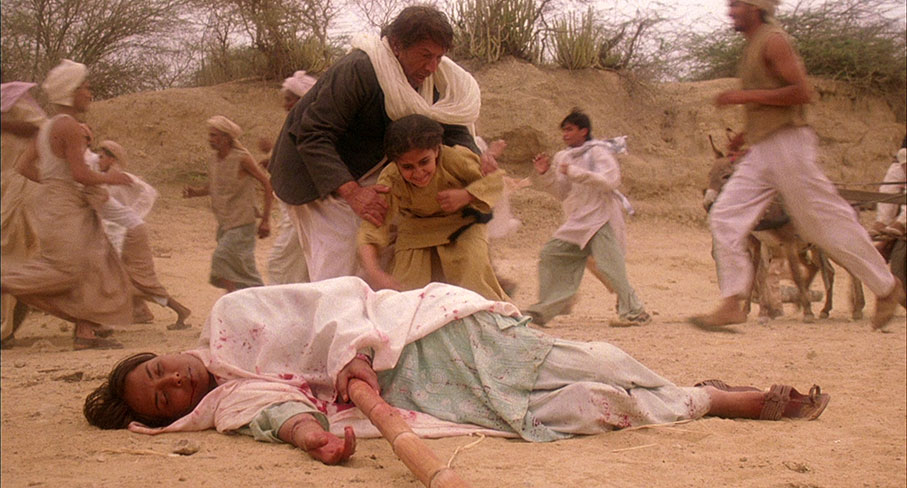
In August 2015, designer and entrepreneur Pradeep N. Rao, answering why the violence had erupted, concluded with the following;
"So here you have it. One of the deadliest cocktails of primal instinct, apathy, prejudice, mistrust, insecurity, opportunism, bigotry and revenge saga humanity has ever tasted. So much so that we are still feeling its collective hangover, a good 67 years after."**
Jinnah covers the same tumultuous period with flashbacks as Gandhi and often similar events too but all from an intriguingly different perspective. Rashomon style, here is the independence of India and the partitioning of the country from the perspective of a man who was concerned specifically about Hindu violence against Muslims. In India, Muslims were the minority and differences in religious doctrines set the two apart to the point of fear and hatred of the other (sound familiar?). I'm not going to weigh in on the absurdity of the argument "My Invisible, Fantasy Overlord and its capricious rules are better than your Invisible Fantasy Overlord and its rules," because reason and common sense negate them all. But the violence was very real and Jinnah was seen by some as a man who acted honourably in the best interests of the Muslim minority but still managed to be helpless in power while primal human and religious urges reigned terror down on his people and everyone else. Jawaharlal Nehru of the Congress Party desperately wanted religious harmony and the British Empire out of India but let's say he was unprepared for realising the depth of distrust and resentment between the religious groups. Oh God, doesn't this all sound eerily familiar? But it damn well shouldn't. Not in 2024.
In Jinnah, Gandhi and Nehru (the three leading lights of the independence movement) you have very different men with different goals and solutions to problems. Now, I am no student of history and I am making the appalling supposition that these three men acted more or less the way their cinematic counterparts did. Gandhi (and in person, this man had very real human flaws according to some biographies) was seen as the non-violence proselytising gentle, great soul who used his ascetic lifestyle as a political tool exuding humility and grace. No matter what you think of the man, you had to admire the façade that he maintained throughout his life until his untimely assassination. I guess by definition, every assassination is untimely. And you have to remember that he was assassinated by a fellow Hindu, a fundamentalist who believed Gandhi was guilty of tearing the country apart when he was in fact against it. Those three bullets logically should have been aimed at Jinnah. Nehru was the consummate politician and the first Prime Minister of India over which he presided for seventeen years. He was also believed to be in a very close relationship with the wife of The Earl of Mountbatten, Edwina. Publicly it is known as a platonic relationship but Jinnah the movie subtly portrays this as a little more than platonic. There's no overt sexuality but Edwina is dressed for bed during meetings in her room so let's let the audience decide. No, not decide their truth... That's Trump's supporters' area of faux-expertise. Jinnah, as judged superficially against these two (the saint and the smooth) is the chiselled, hawk-like, tall statesman, seemingly humourless and distant despite his dexterity as a lawyer. Jinnah's physical resemblance to Christopher Lee is striking. So you have the saint, the smooth and the stolid.
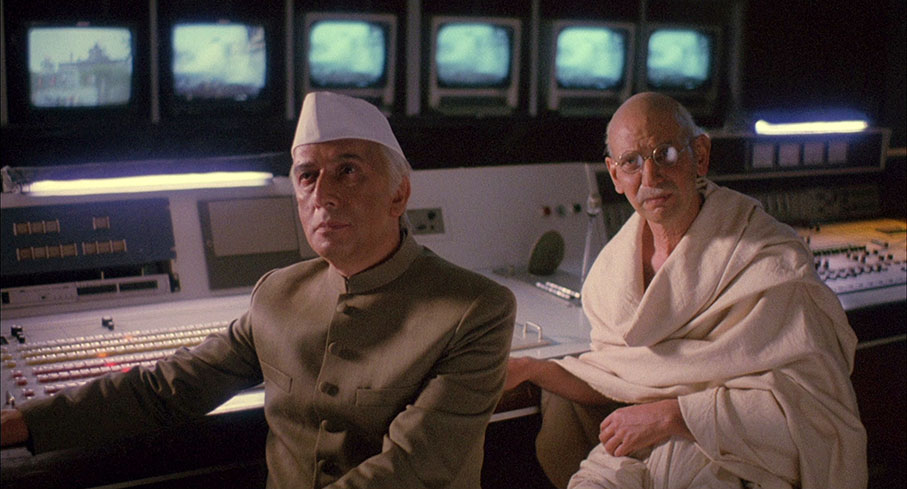
Lee is very good but I'm tempted to believe his own opinion of the merits of his performance is swayed by the responsibility of getting this man right. He breaks down in the movie at some point (hardly a spoiler) but this moment could be interpreted as great acting because it is affecting and heartfelt. On second viewing at another character's words "beg for forgiveness..." I was honestly moved by a man not known for overtly showy performances. Lee is ably supported. It's lovely to see Game of Thrones' Indira Varma (the sister of the poor bastard that gets his head crushed in) in her prime as Jinnah's wife. There are a few guest visits from TV stalwarts (specifically Arnold from Yes Prime Minister – John Nettleton as a deeply patronising British Officer) but what finally made me give up on casting was to see James Fox as Lord Mountbatten. It cannot be true but I feel I have seen countless movies and TV shows where Fox has played a similar role. It's like he's told every agent in the business that he gets first refusal on every English man of authority. His brother Edward, of course, played the murderous Brigadier-General Dyer, the architect of the infamous Amritsar massacre as seen in Gandhi. Richard Lintern is particularly impressive as the younger Jinnah and Shireen Shah plays Fatima, Jinnah's devoted sister with a quiet dignity. Robert Ashby plays Nehru in an almost matching, calm and soothing manner (the speech cadences are identical) as Roshan Seth did in Gandhi. The parallels between the two films cannot be ignored but standing on its own, Jinnah is an intriguing look at the events that tore India apart told from a very different perspective. If history is your thing, this is well worth checking out. All we need now is Nehru (the movie) and we'll have the set.
Before I go any further, I should note that this is not the first UK Blu-ray release of Jinnah, it having previously appeared on the format in 2016 courtesy of Eureka Entertainment in a now discontinued dual format edition, from which the above review by Camus has been sourced and updated. You can read his comments on that edition here. As Camus has the review disc for that edition and we live almost 200 miles from each other, I’m not in a position to compare it to this new Blu-ray-only release from Indicator, so will be judging it purely on its own merits.
The 1.85:1, 1080p transfer on Indicator’s Blu-ray was sourced from an HD remaster by Dehlavi Films, which was created from the original negative with additional grading corrections made under the supervision of director Jamil Dehlavi. I’ve no complaints at all about the results here, with the picture displaying a well-balanced and never aggressive contrast range. Detail is often crisply captured, and the warm hues of the colour palette are attractively rendered without over-saturation. The film grain is there, as it absolutely should be, and while definitely more pronounced in some sequences than it is at others, it does feel organic to the image and is in no way distracting. There is some filtration on some shots (evident from the slight haze around lights) that softens the image – and the black levels – just a tad, but this is clearly a deliberate choice on the part of cinematographer Nic Knowland, and there’s not a whisper of dust or damage here.
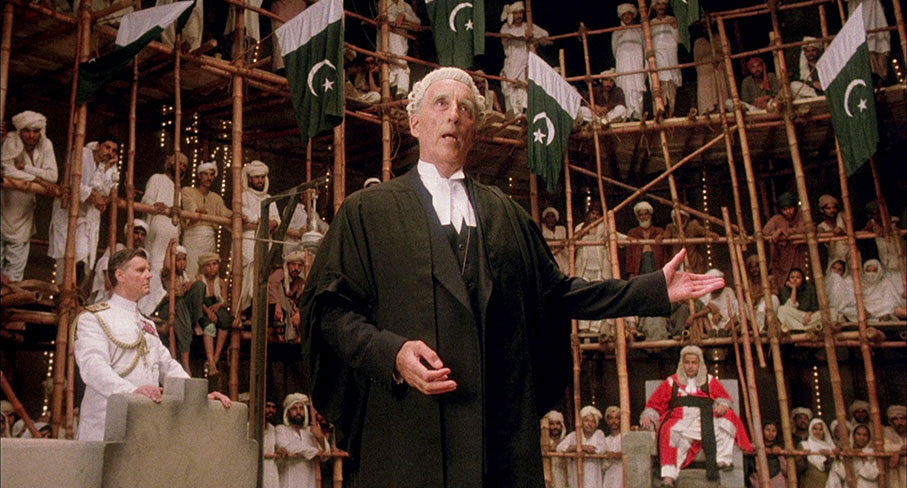
Where the Eureka release had only a Linear PCM 2.0 stereo track, the Indicator disc also includes a DTS-HD Master Audio 5.1 surround track. The results are very pleasing, with a strong tonal range and the dialogue and effects all very clear and a robust presentation of the score by Nigel Clarke and Michael Csányi-Wills. Limited use is made of the surrounds on the DTS track, but they really come to life during Jinnah’s open-air speeches, which the chants and cheers of the crowd come at you from every direction.
Optional English subtitles for the hearing impaired are provided.
While there are surprisingly few on-disc special features for an Indicator disc, this is still a notable step up on Eureka’s movie-only affair, as while second and third are essentially just marketing materials, the first proves to be a real find.
Dare to Dream (37:24)
A 1997 documentary by Asif Arbab and Imran Rizv whose dated opening title sequence should not be taken as an indicator of the high quality of its content. For the first nine minutes it plays like a bog-standard History Channel style documentary, albeit one that provides a welcome if compressed look at the life and achievements of Mohammad Ali Jinnah, told through narration and a generous collection of archive footage and photographic records of the man. The narrator then switches and the next 28 minutes are devoted to the making of the Jinnah movie, and this is no retrospective featurette, but footage shot during the film’s sometimes troubled and controversial production. A wide variety of interviewees are thus given the chance to respond to the negative press stories while they were still being published and impacting the film, which gives the whole thing an immediacy that you rarely find in making-of documentaries. The sheer range of interviewees is impressive, with contributions from many of cast and crew members, including actors Christopher Lee and Shashi Kapoor, director Jamil Dehlavi, and several of the imported British crew, as well as Pakistani lawyers Liaquat Merchant and Syed Sharif-Ud-Din Pirzada – the former a direct descendant of Jinnah and the latter having served as Jinnah’s aid – who came to the defence of the film in the face of an attempted injunction. An unexpected touch of balance is provided by an interview with Imran Aslam, the editor of the Karachi branch of Pakistan’s News International newspaper, whose campaign against the film was a key aspect of a negative press onslaught that included the claim that the script was written by Salman Rushdie and outrage that an actor who once played Dracula should be cast as Jinnah. That said, the documentary then hints at an ulterior movie by revealing that Aslam had tried to audition for the role of Jinnah and had been turned down. Read into that what you will. A really worthwhile and enthralling inclusion.
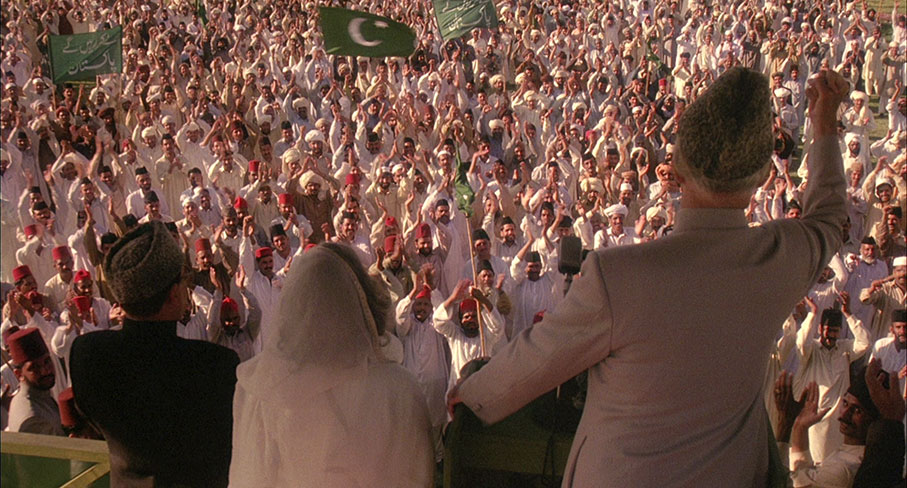
Theatrical Trailer (2:53)
A fairly standard trailer that nonetheless does its job rather well – I’d certainly rather like to see the film after watching this.
Image Gallery
A manually advanced gallery containing 14 behind-the-scenes photos and three posters.
Booklet
The meat of this booklet is a hugely informative essay on the film’s production by film programmer and writer Éric Peretti, which considerably expands on the information provided in the Dare to Dream documentary while supporting the work of director Jamil Dehlavi and laying the blame for many of the film’s production and post-production woes at the feet of executive producer, Akbar Ahmed. Anyone who enjoyed the film should consider this an essential read. This is followed by extracts from five contemporary reviews, including an unexpectedly positive one from Pakistan’s News International, whose Karachi edition was the source of many of the attacks of the film during its production. As ever, the credits for the film are included, and this has to be the most comprehensive collection for a single film I’ve yet seen in an Indicator booklet, running as it does for four packed pages. As ever, the booklet is well illustrated with promotional material from the film.
Camus: An intriguing movie from the perspective of one of the lesser known 'big three' supervising the British Empire's release of its Jewel in the Crown. Jinnah was a complex man trying his best to do the best for his co-Muslims and watching civilisation fall around his ears. Christopher Lee and the cast are fine, and most intriguing is the structure and the almost supernatural element binding all the disparate scenes together with a thematic confidence most non-linear movies do not exhibit.
Slarek: Although this new edition may be a tough sell for those who already own the earlier Eureka release, they may yet be tempted by the 5.1 sound mix, the Dare to Dream documentary, and a revealing booklet essay. For newcomers it’s an easier sell, as while nowhere near as feature-rich as many Indicator Blu-rays, the two key special features really add to your appreciation and understanding of the process of bringing this film to the screen. This release thus comes warmly recommended.
|